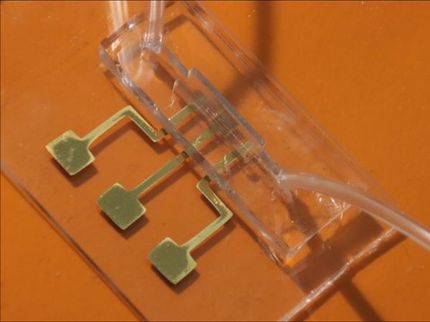Highly potent and stable nanobodies stop SARS-CoV-2
Alpacas provide blueprints for mini-antibodies
A team of researchers has developed mini-antibodies that efficiently eliminate the SARS-CoV-2 coronavirus and its dangerous new variants. The so-called nanobodies bind and neutralize the virus up to 1000 times better than previously developed mini-antibodies. In addition, the researchers were able to perfect the mini-antibodies to such an extent that they are very stable and heat-resistant. This unique combination makes them a promising agent to treat COVID-19. Because nanobodies can be produced inexpensively and quickly in large quantities, they could meet the global need for COVID-19 drugs. They are currently being prepared for clinical trials.

The three alpaca mares Britta, Nora and Xenia (from left to right) provided the blueprints for the COVID-19 nanobodies.
Carmen Rotte / Max-Planck-Institut für biophysikalische Chemie
Antibodies help our immune system fight off pathogens: They bind to viruses and render them harmless - in technical jargon, this is called "neutralizing". Antibodies can also be produced industrially and administered to acutely ill patients. They then act like a drug, alleviating symptoms and shortening the course of the disease. This is established practice, for example, in the case of hepatitis B or rabies. Antibodies are also used as active agents for COVID-19 infected patients. The problem is that the industrial production of antibodies is so complex and expensive that the worldwide demand cannot be met. Nanobodies could be a solution here.
Scientists at the Max Planck Institute (MPI) for Biophysical Chemistry in Göttingen and the University Medical Center Göttingen (UMG) have now developed mini-antibodies that possess all the properties one would expect of an effective drug against COVID-19. "For the first time, they combine extreme stability and maximum efficacy against the virus and its alpha, beta, gamma and delta variants," emphasizes Dirk Görlich, Director at the MPI for Biophysical Chemistry.
At first glance, they hardly differ from mini-antibodies against COVID-19 from other laboratories. They are all directed against a crucial part of the coronavirus: the receptor binding domain - the area of the spike protein on its surface with which the virus recognizes its host cells and can invade them. The nanobodies attach to the binding domain, blocking it and preventing the virus from infecting cells.
"Our nanobodies can withstand temperatures of 95 °C without being destroyed or forming aggregates," explains Matthias Dobbelstein, professor and director of the Institute of Molecular Oncology at UMG. "On the one hand, this tells us that they could remain active in the body long enough to be effective. For another, temperature-stable nanobodies are much easier to make, process and store."
Packs of one, two and three
Even the simplest mini-antibodies from the Göttingen researchers bind up to 1000 times more strongly to the spike protein than previously developed nanobodies against COVID-19. They also bind very well to the mutant receptor-binding domains of the alpha, beta, gamma and delta strains. "Our simple nanobodies may be suitable for being inhaled to contain the virus in the respiratory tract," Dobbelstein said. "Also, because they are very small, they can easily penetrate tissues and prevent the virus from spreading further directly at the site of infection."
The binding efficiency improves even more significantly in the "nanobody triple pack". To do this, the researchers* linked three identical nanobodies together to match the symmetry of the spike protein, which consists of three identical building blocks with three binding domains. "In a way, we combine forces with the triple pack: each of the three nanobodies ideally attaches to one of the three binding domains," reports Thomas Güttler, a scientist in Görlich's team. "This creates a virtually irreversible bond. The triple pack does not let go of the spike protein again and neutralizes the virus even up to 30,000-fold better than the single nanobodies." Another advantage is that the three-pack nanobodies are just large enough that the kidney is likely to leave them in the blood rather than excrete them in the urine within a few hours. This increases their retention time in the body and thus their effectiveness.
As a third design, the team coupled two nanobodies at a time that recognize different areas on the receptor-binding domain and then bind the spike together. "The binding of these 'tandems' is so strong that they are highly resistant to the now ubiquitous mutations that the virus uses to evade the immune system," explains Metin Aksu, another research associate in Görlich's team.
For all nanobody variants - the single as well as the two- and three-way combination - the smallest amounts are sufficient to stop the pathogen. When used as a therapeutic agent, this would put less strain on sick people and significantly reduce production costs.
Alpacas provide blueprints for mini-antibodies
"Nanobodies come from alpacas and have a much smaller and simpler structure than conventional antibodies," Görlich reports. In order to produce the nanobodies against SARS-CoV-2, the team injected the three alpacas Britta, Nora and Xenia from the herd at the Göttingen MPI several times with a part of the spike protein. The animals then formed antibodies against this protein part. After the last injection, the researchers took a small amount of blood from the animals. For the alpacas, this was the end of their mission; the next steps were carried out with the help of enzymes, bacteria, so-called bacteriophages and yeasts. "The overall exposure for our animals is very low, comparable to a vaccination and blood test in humans," explains Görlich.
In the next step, the scientists obtained the blueprints for around one billion different nanobodies from the alpacas' blood. For Görlich's team, everything else was a laboratory routine that had been perfected over many years: the biochemists fished out the best nanobodies from the initially astronomical number of bacteriophages. In further steps, these were tested for their efficacy and continuously improved in several design cycles.
Not every antibody is neutralising. Researchers led by Dobbelstein determined whether and how well the mini-antibodies knocked out coronavirus by recreating viral infections on cell cultures in the lab. "In doing so, we look at which nanobodies prevent the viruses from replicating in cell cultures. By testing the nanobodies in many different dilutions, we find out which amount is sufficient to achieve this effect," explains Antje Dickmanns from Dobbelstein's team. Her colleague Kim Stegmann adds: "Some of the nanobodies were really impressive. Less than a millionth of a gram of these nanobodies in a liter of medium is enough to completely prevent infection. In the case of the three-packs, even another twenty times less is enough."
Also effective against current Corona variants
In the course of the Corona pandemic, new virus variants repeatedly emerged and rapidly dominated the infection scene. These variants are often not only more contagious than the strain originally identified in Wuhan, China. They have also altered their spike protein through mutation in such a way that some originally effective antibodies from infected, recovered or vaccinated individuals can no longer eliminate the virus. Even for an immune system already activated against SARS-CoV-2, it is thus more difficult to stop the virus. This problem also affects already developed therapeutic antibodies and nanobodies.
This is where the new nanobodies come into their own, as they are also effective against known variants of the coronavirus. The researchers had inoculated their alpacas with part of the spike protein of the first known SARS-CoV-2 virus. Remarkably, however, their immune systems also produced antibodies active against the alpha, beta, gamma and delta variants of the virus. "If our nanobodies prove to be too ineffective against a future variant, we can re-immunize the alpacas. Since they have already been vaccinated against the virus, they would very quickly adapt their antibodies to the new variants," Güttler is confident.
Note: This article has been translated using a computer system without human intervention. LUMITOS offers these automatic translations to present a wider range of current news. Since this article has been translated with automatic translation, it is possible that it contains errors in vocabulary, syntax or grammar. The original article in German can be found here.
Original publication
Güttler T, Aksu M, Dickmanns A, Stegmann KM, Gregor K, Rees R, Taxer W, Rymarenko O, Schünemann J, Dienemann C, Gunkel P, Mussil B, Krull J, Teichmann U, Groß U, Cordes VC, Dobbelstein M, Görlich D: Neutralization of SARS-CoV-2 by highly potent, hyperthermostable, and mutation-tolerant nanobodies. EMBO J (2021) https://doi.org/10.15252/embj.2021107985
See the theme worlds for related content
Topic world Antibodies
Antibodies are specialized molecules of our immune system that can specifically recognize and neutralize pathogens or foreign substances. Antibody research in biotech and pharma has recognized this natural defense potential and is working intensively to make it therapeutically useful. From monoclonal antibodies used against cancer or autoimmune diseases to antibody-drug conjugates that specifically transport drugs to disease cells - the possibilities are enormous

Topic world Antibodies
Antibodies are specialized molecules of our immune system that can specifically recognize and neutralize pathogens or foreign substances. Antibody research in biotech and pharma has recognized this natural defense potential and is working intensively to make it therapeutically useful. From monoclonal antibodies used against cancer or autoimmune diseases to antibody-drug conjugates that specifically transport drugs to disease cells - the possibilities are enormous
























































